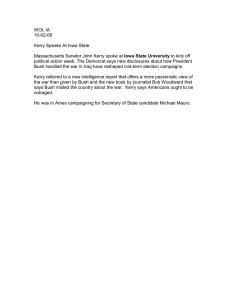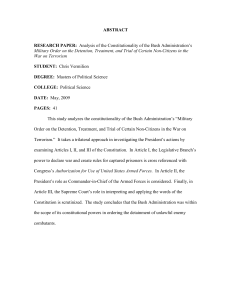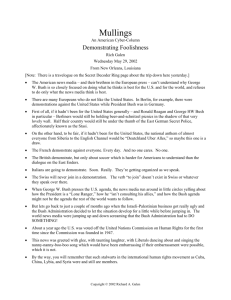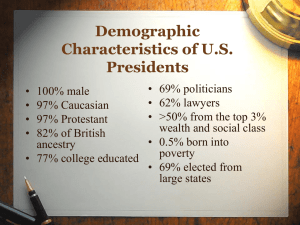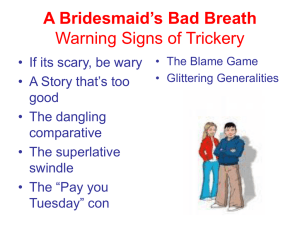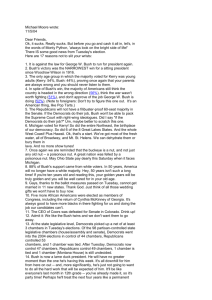Perspectives from the Media eric pianin
advertisement
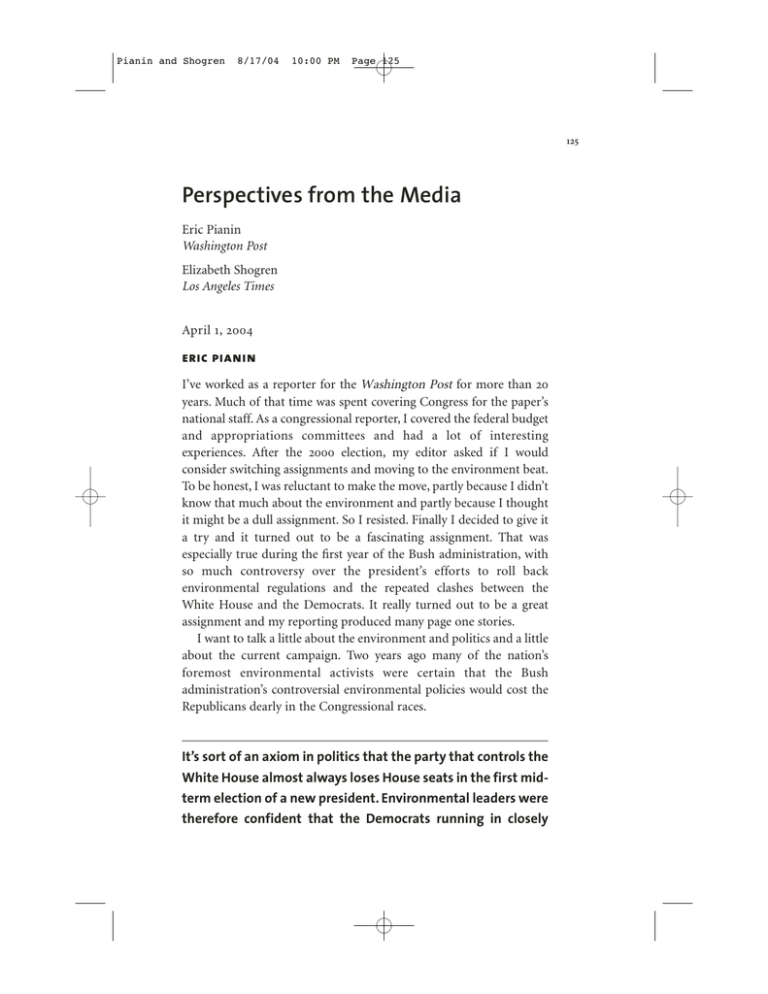
Pianin and Shogren 8/17/04 10:00 PM Page 125 125 Perspectives from the Media Eric Pianin Washington Post Elizabeth Shogren Los Angeles Times April 1, 2004 eric pianin I’ve worked as a reporter for the Washington Post for more than 20 years. Much of that time was spent covering Congress for the paper’s national staff. As a congressional reporter, I covered the federal budget and appropriations committees and had a lot of interesting experiences. After the 2000 election, my editor asked if I would consider switching assignments and moving to the environment beat. To be honest, I was reluctant to make the move, partly because I didn’t know that much about the environment and partly because I thought it might be a dull assignment. So I resisted. Finally I decided to give it a try and it turned out to be a fascinating assignment. That was especially true during the first year of the Bush administration, with so much controversy over the president’s efforts to roll back environmental regulations and the repeated clashes between the White House and the Democrats. It really turned out to be a great assignment and my reporting produced many page one stories. I want to talk a little about the environment and politics and a little about the current campaign. Two years ago many of the nation’s foremost environmental activists were certain that the Bush administration’s controversial environmental policies would cost the Republicans dearly in the Congressional races. It’s sort of an axiom in politics that the party that controls the White House almost always loses House seats in the first midterm election of a new president. Environmental leaders were therefore confident that the Democrats running in closely Pianin and Shogren 126 8/17/04 10:00 PM Page 126 red, white, blue, and green contested races and swing states would capitalize on the President’s seemingly dismal environmental record. After all, within months of taking office the President had repudiated the Kyoto Protocol on climate change, disavowed a campaign pledge to regulate carbon dioxide, challenged scores of Clinton administration regulations, including a tougher standard on arsenic in drinking water, and put in place policymakers throughout his bureaucracy who had strong ties to industry. The Sierra Club and other environmental groups poured millions of dollars into the Congressional contests around the country, including the Colorado Senate race where freshman Republican Senator Wayne Allard, a conservative, held one of the worst voting records on the environment in Congress. Senator Allard was being challenged by Tom Strickland, a moderate Democrat and a darling of the environmental movement. Allard had the audacity to call himself the greatest environmental senator in Colorado’s history, which is saying a lot for a state that produced Gary Hart, Tim Wirth and other prominent environmentalists. But the outcome of the November election was a debacle for the Democrats. Republicans captured control of the Congress, regaining power in the Senate and expanding their majority in the House. The GOP candidates rode the tide of Bush’s popularity, and as for Allard, he easily whipped Strickland by a margin of 51 to 46 percent. I’m reminded of that when I hear leaders of the League of Conservation Voters, the Natural Resources Defense Council, and other environmental groups speak with great confidence this year about how voter outrage over the Bush environmental record can tilt the scales in favor of John Kerry and the Democrats. The argument goes something like this: This year’s election will be incredibly close, possibly a repeat of the 2000 contest between Bush and Gore. The outcome will likely turn on the votes in maybe eighteen swing states throughout the country. Voters are increasingly concerned about the quality of air and water and are troubled by pro-industry administration policies that allow power plants or refineries to Pianin and Shogren 8/17/04 10:00 PM Page 127 pianin and shogren continue polluting. Power plants emit dangerous fine particulates, and mercury pollution poses dangerous health problems for citizens and developmental problems for pregnant women and children. In many of these swing states, tens of thousands of voters who are closely aligned with the environmental cause didn’t bother to vote in the last election. So according to this theory, even if a fraction of those non-voters turn out this time, they could tip the balance in favor of Kerry’s campaign in such critical states as Florida, New Hampshire, Missouri, Ohio, and Nevada. I don’t doubt that environmental concerns could play a role on the margin in some of these states, but they clearly aren’t animating the election campaign. Polling consistently shows that the economy, jobs, and the war in Iraq overshadow all other voter concerns and that the environment ranks fairly low on the totem pole in terms of voters’ priorities. Americans have repeatedly expressed more confidence in the Democrats than the Republicans to be good stewards of the environment. Bush certainly generated a firestorm of protests with his environmental policies in the first year or two of his administration. But I would argue that the administration has done more in the past year or two to spruce up his environmental image and undercut his critics than the Democrats have done in capitalizing on Bush’s missteps. Part of this is a function of clever packaging and sort of Orwellian labeling by the Administration. The President’s proposal for rewriting, and in some cases weakening, the Clean Air Act is called the “Clear Skies” initiative. His new forest management program to give logging companies greater access to old growth trees is benignly called the “Healthy Forest” initiative. But the White House has taken other more substantive steps. In January the President pleasantly surprised environmentalists by abandoning efforts to rewrite the Clean Water Act to sharply reduce the number of streams or wetlands protected from commercial or residential development. Bush halted that rulemaking process several 127 Pianin and Shogren 128 8/17/04 10:00 PM Page 128 red, white, blue, and green days after he met with officials of the Theodore Roosevelt Conservation Partnership and other groups representing nearly 40 million hunters, fishermen, and conservationists who opposed the rule change because it would lead to the destruction of hunting and fishing habitats. The Administration has been widely criticized for attempting to gut Clean Air enforcement regulations in the utility industry known as New Source Review, but in February while the new rule was being challenged in court, the Administration sued an eastern Kentucky power cooperative for violations of the Clean Air Act, making good on a pledge to get tough with polluters in the utility industry. The EPA was also sharply criticized by environmentalists and public health advocates for producing a new rule to regulate mercury pollution that many thought was highly favorable to the utility industry. Last month, Mike Leavitt, the new EPA administrator, acknowledged that the proposed administration rule was too weak and indicated a willingness to consider developing a tougher plan. It seems to me that in a national election, the economy invariably trumps the environment in terms of voter concerns. The President’s recent emphasis on jobs over environmental restrictions in industry comes as poll numbers indicate that Americans increasingly are concerned about jobs, and the exporting of jobs overseas. The Democrats have had little choice but to mute or to tailor their environmental stance when they conflict with the message of economic growth and prosperity. Al Gore was probably the most proenvironmental presidential candidate since Teddy Roosevelt. Yet during the 2000 campaign he downplayed his views on global warming and environmental controls in a bid to gain support in industrial and coal producing states. Even so, he lost West Virginia, which may have cost him the election. This year John Kerry, another strong environmentalist, has attacked Bush for having as he describes it, “the worst environmental administration that I have ever seen,” asserting that the administration is going backward, not forward, on clean air and clean water issues. But Kerry and other presidential candidates had relatively little to say about the environment throughout the primary season. What we’re seeing now is a kind of Democratic transmogrification of environmental issues into slogans and proposals, very different from traditional environmental messages. Pianin and Shogren 8/17/04 10:00 PM Page 129 pianin and shogren The Democrats are reluctant to fight the old battles with industry and corporate America. Kerry is stressing the relationship between progressive environmental policy and the development of alternative sources of energy on the one hand and job creation, economic expansion, and energy security on the other. He contends that Bush has promoted a false dichotomy between tough environmental protection and economic development, just as Bush opposed the Kyoto Protocol because he said it would hurt the U.S. economy. Some of Kerry’s primary campaign efforts were very effective in making the case that if we have these new progressive policies in place then U.S. troops wouldn’t have to die in the Middle East fighting for oil. Frank Luntz, the GOP political consultant, warned his party that Kerry was making real headway with those ads. But you don’t see those ads on the air now, at least I don’t. Instead Kerry is raising complicated, double-edged issues like soaring gasoline prices and automobile Corporate Average Fuel Efficiency (CAFE) standards. By doing so, he is forced to defend old positions he took on raising gasoline taxes or trying to reduce Americans’ dependence on very popular but gas guzzling SUVs and pick up trucks. Things can always turn around in this very protracted campaign season, but for now it seems to me the environment is one of the weakest political weapons in the Democrats’ political arsenal. elizabeth shogren One of the moments in the last two years that really helped to encapsulate the issues Eric Pianin was talking about for me was when I was in the Capitol, going down in an elevator with two of the staunchest advocates for the environment in the Senate, Senator Barbara Boxer (D-CA) and Senator Jim Jeffords (I-VT). I had just been in a press conference where they were talking about environmental issues and trying to get the press all riled up about a string of decisions that the Bush administration had made during the 129 Pianin and Shogren 130 8/17/04 10:00 PM Page 130 red, white, blue, and green summer that reduced environmental protections. The changes included a major reversal in a Clean Air Act rule regarding whether or not older coal-fired power plants have to install new pollution control devices. Another change that the administration made was the ability of companies to sell PCB-tainted sites without first cleaning them up. So the senators were trying to hammer on these issues, making very strong statements in front of the cameras, and then we got into the elevator, where I asked them how they thought it was going. They both looked at me and were so downcast and the gist of what they said was: “Nobody cares. We just can’t get anybody to care. This is so important. People’s lives are changing, and people’s lives are at risk, air pollution is getting greater. These issues are massive and nobody is paying attention to us.” And I thought it was a really interesting kind of view into what it has been like for those people in Washington who have been trying to fight against the Bush administration’s policies on the environment. They feel like they’re getting absolutely no traction under their feet. As we come to the election campaign, of course, those efforts are being increased. Even today, back in Washington, there was a letter signed by those two senators and a bunch of other senators that’s being sent to Mike Leavitt, the new EPA Administrator, on the issue of mercury air pollution. That letter is telling Mr. Leavitt that his plan for dealing with the problem is not doing what the Clean Air Act requires him to do, and it’s a really bad idea. They’re also trying to press on this issue as part of the presidential campaign. I think that out of all the environmental policies that have caused controversy during the Bush administration, mercury is the most notable. The environmentalists are doing a good job focusing on this issue as a way to show that the Bush administration is hurting our environment. I don’t know if you know about mercury air pollution, but the biggest source of it is from coal-fired power plants. It is released into the air and then eventually falls into lakes and rivers, gets absorbed by the fish, the fish are then eaten by animals or people, and then the mercury pollution can be particularly threatening to newborns. So that’s the problem in a nutshell. It didn’t take me long to explain it to you here, but the problem with environmental issues as campaign issues is that you can’t fit that little description into a commercial. So unless you already know why you should be worried about mercury Pianin and Shogren 8/17/04 10:00 PM Page 131 pianin and shogren pollution, it’s not a very good campaign ad. This is why, although environmental groups are very hopeful that they can use the issue of mercury, I think it’s very difficult for them to hang a campaign on it. That doesn’t mean that the environment isn’t going to be an issue in the future, but I completely agree that the environment is not going to be the issue that runs the campaign or even one of the top couple of issues that run the big campaign. One thing that demonstrates it is that nobody is talking about it. John Kerry’s ads don’t talk about the environment. The main Democratic Party ads don’t talk about the environment and John Kerry doesn’t bring it up. Of course it’s not a big issue for the Bush administration to bring up either. So I think if it’s going to become one of the top issues the media covers, the candidates themselves need to start sparring over it. Once they start arguing about an issue, it becomes a big issue in the media. Another way an issue becomes big in the media is when the media seems to have uncovered something that nobody knew was happening. You can respond by asking the question: why doesn’t the media uncover something about the Bush administration’s environmental policies that nobody knew was happening? I do think there will be some of that going on in the next several months. You will see stories that say things like: “Bush administration officials were former lobbyists for industry and now they are environmental officials and they’ve gone out and helped their industries.” The problem with these stories is that they will have a hint of something new, but they will sound a little bit like what everybody already knows by now. I don’t think they will have the sting that they need, and I’m not sure they would get as much attention from editors as they would have. That makes it harder for environmental issues to become much of a campaign issue. 131 Pianin and Shogren 132 8/17/04 10:00 PM Page 132 red, white, blue, and green When you look at the issues the candidates have to talk about, one of the issues where the candidates are farthest apart and where the public believes that the candidates are farthest apart is on the environment. But it just falls too far down on the list of issues most important to respondents of public opinion polls. I looked at some of our polls before I came here and most of the polls showed that about three percent of people answered that the environment was the most important issue to them, and many other issues came before that. That’s not to say that people don’t think it’s important. In fact the polling also shows that the vast majority of Americans want stronger environmental protections, as many as 75 percent. Even the majority of Republicans want stronger environmental protection. It doesn’t seem to be the issue that is top on people’s minds because even though they say it’s very important to them it’s not the issue that seems to run the campaign. That said, I think there are some places where the environment does become very important. This campaign is not being run throughout the whole country, because there are many states where both the Democrats and Republicans know how people are going to vote. There are other states – the swing states where nobody knows which way voters are going to go – where they’re still battling, and in some of those states the environment could possibly be an issue. There are some reasons that I think the environment could be an issue in these states. In New Mexico one of the very hot issues is an environmental issue, the issue of drilling in a place called Otera Mesa. The governor of New Mexico has said that this is going to be a campaign issue, and he’s bringing together a coalition of unusual comrades to work together on the issue, including very conservative ranchers, lots of hunting and fishing enthusiasts, and the environmental community. These comrades include Republicans and Democrats who are all concerned about a Bush administration plan to develop this area, a broad stretch of desert that is very popular, and so there are local Pianin and Shogren 8/17/04 10:00 PM Page 133 pianin and shogren people, lots of New Mexicans, and people from out of state that don’t want it to be developed as an oil and gas field. It will be interesting to see what happens in an area like New Mexico, where there’s an issue that people care about and the Bush administration has a very strong policy that is affecting that area. It will be interesting to see whether it can change the way the election turns. I think it will be a fascinating thing to watch. Will the issue really catch on? Will it matter? Or will it come down to jobs like it does in much of the rest of the country? Another place where there could be such an issue, in fact I might argue an even stronger issue, is West Virginia. West Virginia is another swing state where the Bush administration has changed policies very dramatically on an issue that affects a lot of people who live there – the issue of Mountaintop Removal Mining. What happens with this practice is that the coal companies come in and take layers of the mountain off and take the coal seams from between the layers. Then they have to put the mountain back together. They have a lot of leftover dirt and rock from this practice, and they put it in the valleys. I went on a little flight over this area and it’s just incredible to see. If you fly over West Virginia there are dozens and dozens of these mountaintops that have already been taken apart, and the Bush administration has made a couple of big rule changes that make it easier to keep doing this. They’ve also squashed some legal challenges that would have stopped the practice or slowed it down. So you could imagine that this issue, which has an impact on people’s lives across West Virginia, could catch on. But the truth is that even in West Virginia it hasn’t become a very big political issue, even when they’re electing their own officials. You can imagine that an issue like that, with an environmentally damaging practice that’s so closely tied to the Administration’s policies, could make a difference in the election. In that particular case, however, I 133 Pianin and Shogren 134 8/17/04 10:00 PM Page 134 red, white, blue, and green don’t think it will, even though there are a number of people who are very, very concerned about it. It’s another issue that will be really interesting to look out for. One of the ways that the environment will be an issue, even if it isn’t an issue that the candidates claim this time, is that the rules for money and politics have changed since the last election, so there’s an expectation that a lot of the money that would normally go to the candidates is now going to go to interest groups. People will give interest groups money, and a number of environmental groups will be springing up to take advantage of this change in the way that money in politics is spent. One of the groups is called Environment 2004 and it’s full of old Clinton administration officials. Another one is called Wild Pack and they are the old standbys like the Sierra Club. They’ll be buying ad time and telling people not to vote for Bush basically because Kerry will be better for the environment. So it’ll be interesting to see what this phenomenon does in this election. Will they be able to get enough money to buy ads and make a difference? They’re targeting a few states that they think are most likely to be able to listen to their complaints. One of the top states is Florida, which we all know is where the last election was won and lost. So they are hoping that Floridians who care about the environment will listen to these ads and vote, and at least those in the middle will end up voting against Bush. From the very beginning, however, the Bush administration has taken Florida as a different case when it comes to environmental issues, especially those big issues that people might change their votes on. One of the biggest issues has been offshore oil drilling. You can imagine that, if you live in Florida, what you look out at in the ocean might be very important to you. So while the Bush administration was pushing for offshore drilling to come back to California, they were helping Jeb Bush keep offshore drilling away from the Gulf of Mexico. Pianin and Shogren 8/17/04 10:00 PM Page 135 pianin and shogren They were already working to try to make things easier for them in Florida, and I think that in some ways they defused that issue. That’s not to say that they are not already defensive about the ads that are coming out. There was an ad that recently came out – MoveOn.org paid for this ad – talking about the mercury issue and denouncing the Bush administration’s role on the issue. Recently I received an e-mail from the EPA, a long explanation from Mike Leavitt about how this MoveOn.org ad was wrong. So the government, without even being asked about it, was sending out a response to the ad. Clearly they’re taking this at least a little bit seriously. So it will be interesting, I think it will really interesting, to see some of these issues bubble up even if they’re not a main issue. Maybe there can be more debate on the issue of environment again. It was great to cover the environment in the first year of the Bush administration because everybody paid a lot of attention to the issues. That always makes it more fun for a reporter to cover because your editor likes to produce stories on the front page. But they also give you more time to work on the stories and maybe that can happen again. We won’t get the kind of attention we had during the beginning of the Bush administration, but maybe at least in some of the states these issues will bubble up a bit. response: eric pianin To pick up a little on Elizabeth’s last point, the reason why a lot of these horror stories about environmental rollbacks aren’t having the kind of impact that you would expect them to have, or that they may once have had, is the fact that environmental issues have become so polarized that people on all sides of the issue have pretty much made up their minds. You’re not going to shock people into altering their view of things at this point, and I think that’s especially true in the Congress where I have been sort of amazed at the lack of compromise, or potential grounds for compromise. It just seems that all sides have pretty much staked out their positions, especially in areas like clean air policy where no one can find any kind of consensus. The Bush administration has been promoting their Clear Skies legislation for two years and they can’t even get support from most Republicans for the plan. It’s because clean air is such a 135 Pianin and Shogren 136 8/17/04 10:00 PM Page 136 red, white, blue, and green complicated issue. It breaks down more by region than by political party. Power plant operators in the Midwest have a very different view of the controversy than government officials or residents downstream from those plants who happen to live in the Northeast where a lot of the Midwest pollution migrates. So there’s really no way to try to resolve a lot of these issues democratically in Congress. That’s why this Administration in particular has been doing so much rulemaking. When they’re frustrated trying to get their bills through on the Hill, they turn to rulemaking within the agencies to accomplish a lot of what they set out to do. The rulemaking process, which in many ways is a lot easier for them than passing legislation, may be more time-consuming, but they can pretty much foreordain the outcome. And that’s what you’re seeing on a lot of these clean air issues and mercury pollution issues. The only recourse the environmentalists have now is going into court and suing the government to try and prevent a lot of this stuff from happening. They’ve had a fair amount of success in a number of areas, including tying up the whole effort to revise New Source Review or blocking mining efforts in the Southwest and in the Rocky Mountains. Right now the courts are the environmentalists’ last line of defense. Q&A Q: You hear a lot of stories about the Bush administration bullying reporters into reporting or not reporting on specific issues, and I’m curious to hear your response to that. Have you had experiences with the Bush administration in this manner? pianin: Any reporter covering government officials, members of Congress, or outside advocacy groups invariably will run into major complaints — yelling sometimes, outraged e-mails from officials who feel that they’ve been wronged in your story, or that their position has been misrepresented. Yes, I’ve had rather ugly conversations with some officials at the EPA and the White House over my interpretation of what they are doing. I’ve had members of Congress yell at me or refuse to talk to me for a while, although eventually they have to come back to you, especially if you work for a major news organization. It’s sort of the nature of the beast when you’re dealing with very complicated issues. On controversial issues everyone has a different read on Pianin and Shogren 8/17/04 10:00 PM Page 137 pianin and shogren it and the stakes — financial and political stakes — are enormous for industry, for public health advocates, for politicians running for reelection. What people read in the newspaper or read on their websites or see on TV heavily influences their thinking, so obviously there is real sensitivity to what you report. It just goes with the territory. shogren: I have had instances like that with Bush administration officials, but I don’t think they are any worse than other administrations or businesses or people that I cover. For that matter, I think my biggest complaint about the Bush administration and in dealing with them is that invariably when they are announcing a new regulation – which is a rule that they get to make all on their own – they do it late in the evening on a Friday. Okay, I don’t like that because I’d rather do something social that evening, but that’s not the only problem. It leaves you with a very short amount of time to understand the issue, to write about it, and to get everybody’s viewpoints. It happened more at the beginning of the Bush administration, but it still happens at times now, and I think that’s a technique they use to manage the press. There was one time when they decided to announce an issue regarding aging coal-fired power plants by calling each reporter individually to tell them about the rule. Because I worked for the Los Angeles Times, they decided they could put me at the end of the list, so they called me at 5:00 pm to talk to me about it. It was an issue that was going to be a front-page story. I later talked to an EPA official who was part of their decision to do that. This was not a political appointee, this was just somebody who was an EPA official. I said, “You know that was really annoying the way you guys did that. Why didn’t you just have a press conference?” The gist of his response was “Did you read the coverage? We got all the reporters to write the stories just the way we wanted them to write them. We handled the press so well on that. You cannot argue with the way we did that.” This was not a political appointee and clearly they were pleased as punch because they had gone out to manage the press and they thought they had successfully done it. I think there is a very aggressive effort to manage the media, and sometimes it works and sometimes it doesn’t. pianin: That is true, this has been a very secretive administration. I think from the President on down they put very high value on basi- 137 Pianin and Shogren 138 8/17/04 10:00 PM Page 138 red, white, blue, and green cally keeping your mouth shut, not speaking out of school, not being disloyal to the President. And talking honestly and openly sometimes is considered being disloyal. I thought frankly, particularly in the first year, it was very foolhardy because they essentially refused to talk to the press in any kind of meaningful way about what it is they were trying to do or make people available so that you could actually begin to understand why they were challenging all of these new regulations and trying to rollback existing policies. Why, for example, were they questioning the new standard for arsenic in drinking water levels, why were they rethinking mining regulations, and so on? In a sense they created a vacuum that the environmentalists very happily rushed in to fill and explain in the darkest terms, the most conspiratorial terms, what they thought the Administration was doing. The fact of the matter is that it wasn’t all black and white, and the Administration had some valid points in many of these cases – but they were so silly in not bringing forth knowledgeable people to talk about it. Instead, they relied on public relations people, who a lot of times were totally ignorant of what the policy was if you started asking them questions. They could answer a few of them, but if you tried to probe any deeper, they were in over their heads. I think that really hurt them immensely. The first year of the Bush administration was a public relations disaster from start to finish. All the press coverage angered a lot of voters, angered people on Capitol Hill, it enraged our European allies, and they really had heavy-duty problems. And then 9/11 came along and all of these issues were just sort of swept aside, along with most other domestic policy issues. The war and the attack on the U.S. became the all-consuming story, and I think in terms of interest and attention, the environmental issues, like a lot of other domestic policy issues, never recovered. Q: A few weeks ago a Democratic pollster spoke to us about polling and the environment and he brought up that one of the things he’s seen come out of his polling data is that Americans simply believe that George W. Bush’s record on the environment is too bad to be true, and they have sort of tuned themselves off to it and stopped even thinking about it because they just can’t believe it. What do you think is your role as reporters is in trying to break that down and trying to make it believable to the American public? Pianin and Shogren 8/17/04 10:00 PM Page 139 pianin and shogren pianin: That’s a very good question. That’s really a challenging dilemma for a lot of environmental reporters. The way I approach the beat is to constantly be on the government’s case so that I can explain these policy changes as they come along – not always waiting for the opportunity to do a big story that sort of weaves it all together, although that’s very important, but chipping away at the story, because if you think about what constitutes environmental policy in this country, it covers an enormous range of things. As reporters, Elizabeth and I cover the EPA, which is a big sprawling bureaucracy that conducts research, oversees environmental impact statements, and issue regulations all the time. Then there’s the Department of the Interior and the Bureau of Land Management with their responsibilities for hundreds of millions of acres of federal lands throughout the country. They’re the world’s largest landlords, if you will. The relationship between the Administration and these agencies, and whether policymaking is top down or bottom up, is a major question. Then you have the Congress, which has a huge say in policy both in the authorization process and in the appropriations process. Every year Congress passes spending bills, and they attach amendments that dictate a policy for a year’s time on a wide-range of environmental issues, energy issues, and so on. Then there are all these environmentalists and they all have their own agendas and they’re all churning up reports, studies, and advocating stuff. As a reporter you have to clear away 95 percent of what is confronting you because either it’s extraneous or it’s not that important. Then you figure out that there are two or three things that are most important and you’re given a week to write about them. I think the big criticism of the press is that we’ve let the Bush administration off the hook, and we haven’t told Americans what is really going on. The fact of the matter is there are a lot of policy makers from industry now calling the shots, which is a little scary. And you have an Administration that came into office with the mandate of being industry-friendly and they had a lot of promises and campaign pledges to make good on. West Virginia helped elect the President, so guess what? One of the first things the Administration did was signal that there was going to be a revival of the coal industry and that coal production would be a lot easier. They’re not going to go after these mining companies that do mountaintop removal, which is really a 139 Pianin and Shogren 140 8/17/04 10:00 PM Page 140 red, white, blue, and green horrendous thing. Elizabeth is right. It’s just destroying the terrain of this gorgeous state for limited economic benefit to the state. Once they mine that coal, that’s it. Those companies are out of there and those jobs are gone. So the bottom line is that it’s a tough job for a reporter to be the arbiter of what is actually going on. We’re just ordinary human beings trying to understand the stuff and explain it in a way that readers can follow. shogren: This is more a commentary from me than a direct answer to your question, having my nose in these issues for a long time. One of the reasons I think people say that the Bush administration’s record on the environment can’t be as bad as they say it is, is because that’s true. If you pick up the Sierra Club magazine or some other environmentalist group’s version of the Bush administration’s policies, they’re going to write everything to the extreme and they’re going to say that everything the administration’s done is bad, when in fact that’s not true. There are some things that the Bush administration has done for the environment that are exceedingly positive. The biggest example is diesel emission regulations from the buses and trucks that spew smoke as they go down the street. They didn’t write that rule, but they decided to keep that rule on the books when they could have jettisoned it. I’m not trying to say that the Bush administration is just wonderful for the environment, but I think that when somebody exaggerates, people tend to not believe them and I think sometimes the environmental groups hurt themselves by overstating things. At least it works that way with me when I’m trying to figure out whom to believe when I write a story. Q: Early in your talk you said that during the primary season the Kerry campaign did seem to get some traction on the issue of merging energy security with environmental concerns. Why do you think they dropped it and do you think it might be something that might come back? pianin: I sense that the focus of his message is shifting away from that to what he thinks are major opportunities for exploitation, including the soaring gasoline prices and the whole issue of CAFE standards, but what I’m saying is that that pushes you into a swamp. Pianin and Shogren 8/17/04 10:00 PM Page 141 pianin and shogren You get into those issues and they’re so complicated. The reality is that it’s easy to say: “Why hasn’t President Bush done more about gas prices? I can’t believe I’m spending two dollars for a gallon of gas.” The reality is that there is very little any sitting policy maker can do in the short-run to affect gasoline prices. You can jawbone OPEC or you can monkey with the oil reserve a little and put a little more in the commercial market or you can do something about lowering gasoline taxes. That’s about it. For Kerry, when he raises this as an issue, he opens the door for the administration saying “Well let’s go back and look at your record for the last twenty years. Where were you on the gasoline tax? Oh, you proposed raising the gasoline tax fifty cents a gallon in 1994! Isn’t that interesting!” Or, “You want to take SUVs away from soccer moms in the suburbs? Well, how un-American can you be? You thought you had a great issue going and now you have to explain some of these things. So now the Administration is doing a tap dance on you. Something isn’t quite right about that political strategy. 141
